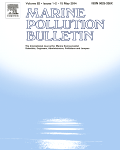An editorial, “Managing Ocean Information in the Digital Era—Events in Canada Open Questions about the Role of Marine Science Libraries,” penned by Peter Wells (EIUI and International Ocean Institute), has been published in the Marine Pollution Bulletin. Initiated by deep concerns about recent major cutbacks to the marine science libraries of the Canadian federal government, the article raises probing questions about the importance and availability of marine scientific information in the digital age. It seeks to draw attention to the essential roles of libraries in research institutes, to the value of grey literature much of which in the marine field is not (yet) digitized, and to the importance of effective information management and information professionals to ocean protection and conservation.
The editorial in Marine Pollution Bulletin [83(1) (15 June 2014), 1-4, DOI 10.1016/j.marpolbul.2014.04.012] has been published open access and is available at this link. The text of the abstract is as follows:
Information is the foundation of evidence-based policies for effective marine environmental protection and conservation. In Canada, the cutback of marine science libraries introduces key questions about the role of such institutions and the management of ocean information in the digital age. How vital are such libraries in the mission of studying and protecting the oceans? What is the fate and value of the massive grey literature holdings, including archival materials, much of which is not in digital form but which often contains vital data? How important is this literature generally in the marine environmental sciences? Are we likely to forget the history of the marine pollution field if our digital focus eclipses the need for and access to comprehensive collections and skilled information specialists? This paper explores these and other questions against the backdrop of unprecedented changes in the federal libraries, marine environmental science and legislation in Canada.
